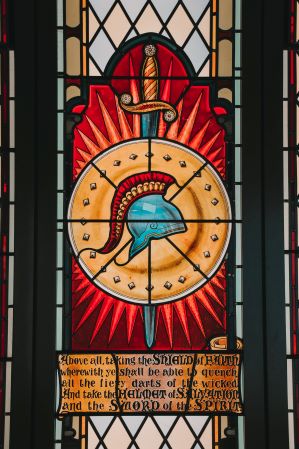
Address to the Edinburgh Diocesan Synod
27th October 2022
A few days after I returned from the Lambeth Conference I was visited by Bishop Nathan, acting Archbishop of Papua New Guinea, and his wife Jessicah – a visit coordinated by John Rae, of St Anne’s Dunbar who, with his wife Della, had spent time working for the church in that part of the world. ‘I have come,’ said Bishop Nathan, ‘to thank you.’ ‘What are you thanking me for,’ I asked. ‘For the support your Province and your diocese has given to my Province,’ he replied. He explained that of all the ordinands studying in their seminary at least half are sponsored by the SEC, whether through our Global Partnerships Committee or through the contributions of individual congregations in the Edinburgh Diocese.
My embarrassment at not knowing this was easily outweighed by my delight in hearing it. To those of you involved in this quiet act of generosity – and you will know who you are – thank you. But I can assure you that I offered my gratitude to Nathan too, for all that he and his people are doing in the service of Christ, in a land where such service is often difficult and even dangerous. For it is part of the mission in which we are all engaged, with which we are all entrusted, to make disciples of all nations.
I begin with this story, because one of the most significant takeaways from the Lambeth Conference for me was this sense of the global interdependence of God’s church. That a high proportion of our brothers and sisters in Christ face challenge, persecution and physical danger because they are being faithful. ‘Put on the whole armour of God,’ says St Paul in our reading at the Eucharist just now. We may find that an unduly militaristic image, but we need to be aware that there are many who require every protection their faith can offer. Don’t we all need to don the belt of truth, the breastplate of righteousness, the shield of faith?
I consider that one of God’s most precious gifts to us is the opportunity to belong to a community that stretches our vision beyond our own small concerns, gives us new insights on what we mean by diversity and requires us to lift our eyes to see that we, ultimately, belong to one world and one human family. No coherent government policy, whether it pertains to internal or external matters, can be formed without this perspective. Especially so when we face a climate crisis. Especially so when world peace is so fragile and when we find ourselves at the mercy of the megalomaniacal ambitions of not one but several dangerous demagogues. Dictators who have at their fingertips a nuclear button.
I don’t mean by this to belittle but simply to set in context our difficulties at home in the UK. The winter ahead of us will demonstrate all too clearly that it is the weakest amongst us who will suffer most from the cost-of-living crisis, the energy crisis and the consequences of recent political disasters. Whether these disasters are behind us remains to be seen, but the present time requires us, as Jesus’ disciples, to stand up and be counted.

Thank you to those congregations who are already responding to this. Food banks, of course, but also those of you who offer counselling, financial advice or provide warm spaces where people who can’t afford to heat their home can go for comfort. Please be ready to tell your stories. You’ve been introduced to our new Communications Officer, Miranda Heggie, and she wants to hear what you’re doing and to share it, not to boast but to encourage others also to act… and to speak out. Don’t underestimate the importance of declaring boldly (St Paul again) the mystery of the gospel of repentance and justice and salvation.
We’re not excused this because we too may be struggling. Nor, as we shall hear in a moment, do painful financial realities excuse us from addressing the challenges of the climate crisis. Apology is required, both in the sense of apologetics, giving the reason for the hope that is in us – a hope in God our Creator who has entrusted us with this planet – and apology as repentance, for our negligence or betrayal of God’s trust.
World and nation. These are big picture matters that challenge us, for sure, but which also remind us of our solidarity with our human and non-human companions on this planet, and draw us, drive us, inspire us to loving and compassionate action. There is darkness in all this, but light too – or at least a sense that we must be on our way, like Jesus in the gospel reading just now, who set his face to go to Jerusalem and face the consequences.
I admit, however, that sometimes in the church the light isn’t always easy to find. I know that many of you will have been praying for Bishop Anne and the Diocese or Aberdeen and Orkney, yet what has seemed like distant thunder has in recent weeks come much closer to us. Certainly, closer to me because I’ve been entrusted with the task of being their acting bishop whilst Bishop Anne is away from duty.
I ask for you active prayers and your understanding. It’s likely that I shall be in Aberdeen for a couple of days every three weeks or so, but clearly, there will be daily demands, not least because it is a busy diocese with all the usual range of issues, some bad, many very good and encouraging, all time-consuming. This will inevitably impact my availability and the speed with which I can respond to you.
I’m especially conscious that this commission to me will spill over into extra demands on others, not least our Dean, Frances, and Godfrey, our Diocesan Secretary, both already hard-pressed, not to mention our staff in the Diocesan Office. Please be understanding, quick to forgive and eager to pray for us all. I am expecting this situation to continue for some months and I’m grateful to those who have already offered to step up and share the burden.
Having said all this, and I accept that the situation in Aberdeen reveals all too clearly our human frailty and fallibility at all levels of the church, this evening’s Synod offers some very positive possibilities for the ongoing life of this diocese. Church budgeting is always, at its best, about fulfilling Christ’s call to be disciples. And you will see in the papers and hear from our speakers how we are hoping to use our financial resources as rainy-day funds to open up new possibilities and to invest in the future of our church. I hope you won’t find any comfortable self-delusions here, but neither will you hear a narrative that assumes that we are on an inevitably downward spiral.
The future of our church, of course, doesn’t depend on diocesan initiatives but on the empowering life of the Holy Spirit expressed through individuals and through our congregations too. As I travel the diocese and talk with our clergy and Vestries, I find so much to encourage me – so much to reassure me that God hasn’t given up on us. All sorts of tremendous things are happening – I’ve alluded to some of them already – and nearly every congregation I visit reports that they have new members, who arrived even during Covid, perhaps because of it.
I do believe God answers prayers and sometimes we manage to make our requests in such a way that God is pleased to answer ‘yes’. But prayer is never a passive thing. The whole armour of God doesn’t attach itself to us by magic, we have to put it on and use it. And if ever there was a time when the world needed a fully equipped peace-making force dedicated to the Prince of Peace who came not to be served but to serve then, surely, this is that time… this is that moment.
